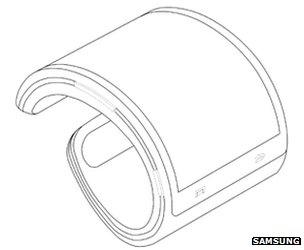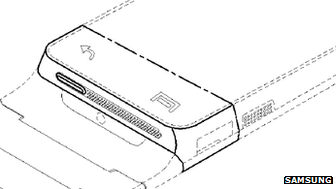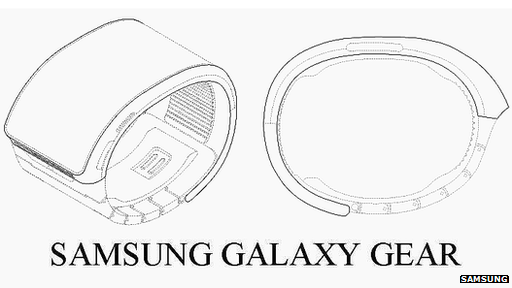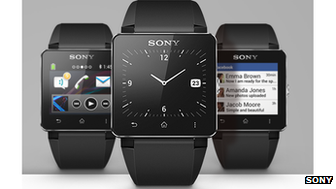Samsung smartwatch revealed by patent filings
- Published

Samsung's design shows a flexible screen that curves round the wrist
Details of Samsung's smartwatch plans have been revealed in a series of unearthed patent and trademark filings.
Drawings show a device with a flexible screen that wraps round the wrist, with other parts made of metal and synthetic materials.
Other documents reveal the company has registered the names Samsung Gear, external in South Korea and Samsung Galaxy Gear, external in the US.
Analysts are divided about how much demand there might be.
Tech consultancy Canalys has predicted that sales, external of smartwatches will "explode" from 330,000 units shipped last year to more than five million in 2014.
"Smartwatches will be the most important new product category in consumer electronics since the iPad defined the market for tablets," said analyst Chris Jones.
"Software platforms tied to smartwatches will also be a tremendous opportunity for developers to write apps in categories such as health and wellness or sports and fitness."
Smartglasses preference
But market research company IDC is taking a more tempered view after it surveyed 1,513 consumers in the US.

One drawing shows a physical power button, speaker grille and symbols previously used as controls for a Galaxy phone
It said only a minority of respondents showed strong interest in any of the suggested features.
The most popular application was seeing who is calling your phone from your wrist, with about 14% of those questioned saying they were very interested in it.
Reading Twitter or Facebook messages via a watch when a mobile was nearby only appealed to about 7%.
"The small screen size means many of the suggestions didn't seem relevant," said Francisco Jeronimo, a mobile device expert at the company.
"We also found there was much more interest in smartglasses, with features such as recording a video or taking pictures of what you are looking at proving most popular. The reason for that is that this offers a new feature that consumers can't get from any other existing device."

Samsung has confirmed it is working on a watch but has not given a launch date
South Korean news site Moveplayer revealed, external that Samsung has filed patents for three slightly different smartwatch designs with the country's patent office since the start of the year.
They indicate it is looking at creating a curved bendable screen that covers about half of the device. At one end of the display is a small panel with a back arrow and home keys similar in design to those found on its original Galaxy S Android handset.
Range of competitors
The drawings also show a physical power button and speaker, and the accompanying descriptions note that the screen can be attached to different straps to accommodate customers' varying wrist sizes.
The documents add that the devices should provide access to the internet; be able to make and receive phone calls, emails and texts; and store personal information.
Samsung will compete with several other tech firms who have all released, or at least announced, smartwatches since the start of the year, with contrasting marketing campaigns:
Sony is pitching, external its Smartwatch 2 as a rainproof "accessory" to its Xperia Android smartphones
Omate says, external its Truesmart watch is designed to be a "standalone" device featuring a five megapixel camera on its side
TomTom is, external targeting the fitness market with its Sport Watch range, offering a heart rate monitor and speed sensor as add-ons
Pebble highlights, external its energy-efficient electronic paper display and customisable watch face designs
Shanda talks, external of its Geak Watch's ability to play movies, record the user's blood pressure and track sleep patterns
Many of the predictions about the sector's expected growth are based on news from other companies: confirmation from Microsoft and Samsung that they are working on watch designs, and patent documents from Apple and Google suggesting they are at least considering the concept.
'Beat its rivals'
According to IDC's survey Samsung could find it hardest to crack the US market.

Sony's smartwatch has a more angular design
When IDC asked which of the brands they would most trust to develop a wearable device that embedded communication functions and internet features, 39% picked Apple, 27% Google, 21% Microsoft and just 17% Samsung.
This was even though the South Korean company shipped more than double, external the number of smartphones than its nearest competitor in the quarter to the end of June.
"A similar survey a few years ago would have shown Samsung far behind its rivals when it came to smartphones as well before the Galaxy range became established," Mr Jeronimo said.
"If it can beat its rivals over price, ease of use and the amount it spends on advertising, as well as offering unique features - perhaps acting as a TV control in a clever way - then it can still beat other smartwatch brands."
Samsung's next scheduled press event is at the IFA consumer tech show in Berlin on 4 September.
- Published19 June 2013
- Published23 April 2013